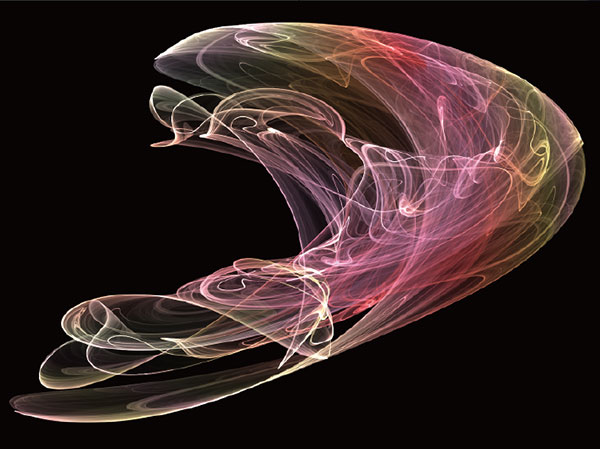
HOME / Departments / Mathematics
Mathematics
Research
What is mathematics?
Most people enjoy the sight of stars twinkling in the night sky, and at least once would have tried to count how many there are. This would most probably have led to a belief that there was an infinite number of stars, because it was not possible to count them all. We could also try to count the prime numbers, starting with 2, 3, 5, 7, 11, and so on. The primes are the base for natural numbers, as any natural number can be factorized into a product of the prime numbers. Indeed, this is the foundation of a cryptography theory that is used in modern day encryption systems. Even though the factorization of a natural number into primes can be very difficult, the multiplication of known primes is of course very easy; making this a good method for making virtually unbreakable cryptograms.
About 2500 years ago in ancient Greece, some people wondered how many prime numbers there are, just as many people today have thought about how many stars there are in the sky, or how many grains of sand there are on a beach. These ancient Greeks studied at the school of Pythagoras in Croton, which is now in the southern part of Italy. They showed that indeed there are infinitely many prime numbers. In truth, the reason why they investigated this problem was probably not because they thought that solving it would be useful for society. However, when we retrace past events, we find that analyzing the mysteries of prime numbers, which have been undergoing analysis ever since, has pioneered research that has indeed been useful for society such as the development of unbreakable cryptograms. This is but one example of how essential mathematics is for our society.
Theories in mathematics always follow precise logic, giving an eternal verity to any discovered theorem. Once a discovery is proven, it is forever true and never needs correction. Of course, there are many remaining practical problems in mathematics that we want to resolve, just as there are in other technological sciences. Equally, with some problems that interest mathematicians it is difficult to ascertain any practical benefit for our society coming from their solution. Recently, various applied fields of mathematics have been investigated, such as the foundations of physics, information and statistical sciences, or the field of mathematical finance; these are similar to the traditional "pure" fields of mathematics that involve solving mysteries concerning integers or figures. Sometimes young people, such as graduate students, make great discoveries that surprise the world. This is one of the most exciting aspects of the field of mathematics.
In the department of mathematics at Kyushu University, there are about 70 mathematicians who are members of our faculty; it is a very active place for research in this subject. It is also a source of pride to us that our research fields are diverse, ranging from basic classical theories up to the latest frontiers of applied mathematics.
We hope that our students will use the vigor of their youth to study and undertake research in mathematics here at Kyushu University; perhaps someday providing the solution to an as-of-yet unsolved mathematical problem, the answer to which is sought for by the entire mathematical community.

Education
Undergraduate School
The Department of Mathematics offers a wide spectrum of undergraduate courses covering both pure and applied mathematics, and includes some courses in Computer Science and Statistics. Students gain basic knowledge and skills in pure mathematics, and thereafter proceed to advanced topics in a broad range of modern pure and applied mathematics. Teaching within the department is provided by the faculty members of the Graduate School of Mathematics.
Graduate School
See the web page of the Graduate School of Mathematics.

Research Groups
- Algebraic Geometry
- Algebraic geometry uses algebra and phase analysis to research geometric figures resulting from the common zeros of polynomial equations. It also unravels the complexity of figures and discovers amazing states. This field is deeply related to commutative algebra, complex manifold theory, and arithmetic geometry.
Read More
- Complex Analysis
- Complex analysis expands single-variable complex analysis (function theory) studied in undergraduate mathematics to multiple variables and the analysis of complex manifolds.
Read More
- Computational Mathematics
- The field of mathematical calculation performs educational research on information and mathematical science (computer mathematics) and numerical analysis and researches the development of software for representing various mathematical phenomena that appear in the natural sciences, engineering, and information science.
Read More
- Differential Equation
- Differential equations have a close relationship with various scientific fields in addition to mathematics, and their research is expanding greatly in various directions. Typical areas of study include ordinary differential equations, partial differential equations, and stochastic differential equations.
Read More
- Differential Geometry
- Differential geometry is a field having one source in Gaussian curvature theory. It attempts to understand the geometrical properties of a figure from its degree of bending (curvature). Differential geometry is related to various fields including topology, integrable systems, and information theory.
Read More
- Dynamical System and Ergodic Theory
- The field of dynamical systems is concerned with the mathematical formulation of rules that describe temporal evolution. For example, the equations of motion in classical dynamics (ordinary differential equations) for describing the motion of a celestial body or a spinning top over time are well known, but dynamical systems also serve as models in various fields such as physics, ecology, and economics and for chemical reactions as well. A variety of dynamical systems have also come to be defined in the course of mathematics research. Dynamical system theory makes use of real analysis, algebraic geometry, topology, function theory, probability theory, numerical computations, and other techniques to investigate the properties of dynamical systems.
Read More
- Infinite Integrable Systems
- Research in infinite integrable systems is mainly concerned with the fact that system and equations like nonlinear waves, statistical physics, and field theory that have been traditionally difficult to analyze may be subjected to rigorous and detailed analysis thanks to a good mathematical structure in the background. In this field, algebra, geometry, analysis, and application all come into play enabling researchers to enjoy those aspects of mathematics that make it so intrinsically fascinating.
Read More
- Mathematical Physics
- Mathematical physics aims to solve mathematical problems originating in quantum field theory, statistical mechanics, and fluid dynamics using analytical techniques such as functional analysis and probability theory. This field of study is not bound by existing methodologies and develops new mathematical techniques as needed.
Read More
- Mathematical Statistics
- The field of mathematical statistics aims to theoretically clarify the properties of statistical and computational techniques for analyzing various types of data. It also proposes and tests new data analysis techniques and researches their application in various sciences.
Read More
- Number Theory
- The field of number theory researches various types of mathematical subjects directly and indirectly related to numbers. Specifically, it researches algebraic manifolds, motifs and automorphic forms and representations, associated Galois representations and zeta and L-functions, and the special values, multiple zeta values, periods, ideal class groups, algebraic cycles, and K-groups of those functions. Similarities between subjects in number theory and those in topology (especially knot theory) are also researched. Algebraic, geometric, and analytical methodologies are all used in number theory, which also has a deep relationship with representation theory. Computers can be actively used in this field.
Read More
- Operator Theory, Operator Algebra Theory
- The field of operator theory and operator algebra theory researches discrete linear operators (infinite matrices) on Hilbert spaces and resulting algebraic systems. The analysis of noncommutativity and infinite dimensionality is a special concern of this field. By studying bounded linear operators globally, it provides a basic language for describing non-commutative geometry and free probability theory. As a geometric application, the formulation of Jones polynomials, known as knot invariants, has also attracted the attention of many experts.
Read More
- Optimization
- Optimization treats social phenomena and science and engineering problems as extrema-with-side-conditions problems and researches mathematical theories and techniques to find optimal solutions to those problems.
Read More
- Probability Theory
- Probability theory is a mathematical body of theory for analyzing random phenomena in a logical manner. The world, indeed the universe, is full of randomness making this a highly broad field of research.
Read More
- Representation Theory, Harmonic Analysis
- The field of representation theory and harmonic analysis takes up sets like groups acted upon by an algebraic system and researches sets that are invariable to or based on such action. This is a field that can be approached from various viewpoints: in addition to algebra, mathematical analysis may be used for a set resulting from a function while geometry may be used for a set having a geometric structure.
Read More
- Topology
- In topology we consider geometric objects like figures and study their properties which are invariant under continuous deformations, from various perspectives. This area is a relatively new field in mathematics.
Read More
- Mathematical Biology
- In mathematical biology, we use theories of mathematics and physics to study life phenomena and ecosystems. We construct models corresponding to things of interest, and through the analysis, we aim to deepen our understanding of phenomena and propose testable predictions.